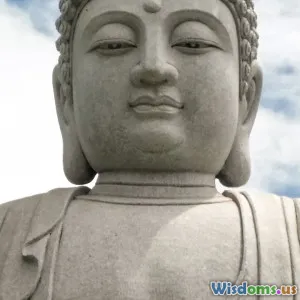
Navigating Life's Questions Through Philosophy
5 min read Explore how philosophy can guide you through life's profound questions and enhance your spiritual journey. (0 Reviews)
Navigating Life's Questions Through Philosophy
In a world teeming with uncertainties, many individuals find themselves grappling with profound questions about existence, purpose, and ethics. As we seek answers, philosophy offers a rich tapestry of thought and reflection, guiding us through life's complexities. This article delves into how philosophical inquiry can illuminate our spiritual journeys, helping us navigate life's most pressing questions.
Understanding Philosophy
Philosophy, at its core, is the study of fundamental questions about existence, knowledge, values, reason, mind, and language. It encourages critical thinking and self-reflection, allowing individuals to ponder their beliefs and the world around them. Unlike dogmatic religions or rigid doctrines, philosophy invites open-ended exploration, fostering personal growth and understanding.
The Intersection of Spirituality and Philosophy
Spirituality often seeks to address questions of meaning and existence, making it a natural ally to philosophy. While traditional religious practices provide structured answers, philosophy encourages an inquiry that can be deeply personal. Combining these two realms can lead to a more nuanced understanding of one’s beliefs and values.
1. Existential Questions
Many people encounter existential questions at various life stages: What is my purpose? Why am I here? Philosophers like Sartre and Camus have explored these themes, suggesting that meaning is not inherent but constructed through our choices and actions. This perspective empowers individuals to create their own narratives rather than relying on externally imposed meanings.
2. Ethics and Morality
Questions of right and wrong can often feel overwhelming. Philosophy provides frameworks for ethical reasoning. Utilitarianism, for instance, encourages us to consider the consequences of our actions, while deontological ethics focuses on the morality of actions themselves. By engaging with these theories, individuals can make informed decisions that align with their values and contribute positively to society.
3. The Nature of Reality
Philosophical inquiry also delves into the nature of reality itself. Questions such as What is real? and How do we know what we know? can be explored through the lens of metaphysics and epistemology. Engaging with these topics can enhance one's spiritual experiences, leading to a deeper appreciation of the interconnectedness of life.
4. Mindfulness and Presence
Philosophy promotes mindfulness through practices that encourage living in the moment. Stoicism, for example, teaches the importance of focusing on what we can control and accepting what we cannot. This mindset not only alleviates anxiety about the future but also enhances spiritual practices like meditation and contemplation.
Practical Applications of Philosophy in Life
Incorporating philosophical inquiry into daily life can take many forms. Here are a few practical approaches:
- Reflective Journaling: Write about your thoughts on existential questions or ethical dilemmas. This practice can clarify your beliefs and values.
- Philosophical Discussion Groups: Engage with others in conversations about philosophical topics. Different perspectives can broaden your understanding and foster deeper insights.
- Daily Reflection: Spend a few minutes each day contemplating a philosophical question. This can enhance your awareness and deepen your spiritual practice.
Conclusion
Navigating life's questions through philosophy can be a transformative experience. By engaging with philosophical thought, we not only enrich our understanding of ourselves but also enhance our spiritual journeys. As we explore these profound questions, we move toward a more meaningful existence, equipped with the tools to face life's uncertainties with confidence and clarity.
By embracing philosophy as a guide, we open ourselves to a world of possibilities and insights that can lead to greater fulfillment and a deeper connection to our spiritual selves.
Rate the Post
User Reviews
Popular Posts




















